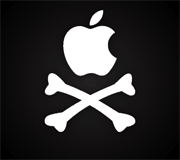Following two years of negotiations, this summer saw Russia’s State Duma adopt the final text of a new amendments to copyright law. Subsequently signed off by President Putin, the law came into effect October 1, 2020, adding new powers to Russia’s tightening anti-piracy strategy.
Remove Pirate Apps or Face ISP Blocking
With site blocking for repeated copyright infringement already on the books in Russia, the new law aims to put similar pressure on sites and services offering mobile applications that reportedly breach the rights of copyright holders. These include apps that offer movies, TV shows, and music for free, or allow the downloading of tracks from streaming platforms such as YouTube for playing offline.
While the law can target any distributor of infringing apps, Apple and Google’s position as the largest players thrust the pair into the spotlight. While ISP blocking of less popular third-party platforms may raise an eyebrow or two, the prospect of these giants becoming subjects of a blockade raised the stakes significantly.
Google and Apple Officially Invited to Begin Cooperation
Given the importance of the development, during the first week of October local telecoms watchdog Roscomndazor wrote to the US-based companies, advising them of the new amendments and requesting cooperation in the event that their platforms play host to contentious applications.
According to the government agency, both have now responded indicating they are willing to cooperate.
“Roscomnadzor received letters from Apple Inc (October ![]() and Google (October 14), in which company representatives expressed gratitude for the notification of the entry into force of the new federal law of the Russian Federation and provided contacts for prompt interaction in the execution of court decisions,” Roscomnndazor’s press service informed TASS.
and Google (October 14), in which company representatives expressed gratitude for the notification of the entry into force of the new federal law of the Russian Federation and provided contacts for prompt interaction in the execution of court decisions,” Roscomnndazor’s press service informed TASS.
Both Google and Apple Required to Act Quickly
Our earlier coverage outlines the complaints process in detail but, in summary, it involves copyright holders filing complaints about apps with Roscomnadzor which is required to determine who is hosting the software within 72 hours.
From there, Roscomnadzor will send a copyright infringement notice (in English and Russian) directly to the platform demanding that the infringing tools are rendered inaccessible. Developers will be given a chance to take action themselves in the interim by either removing the software or ensuring that the alleged infringements are addressed within 24 hours.
Ultimately, however, Google or Apple will have to take action since if the infringement continues, they could be held liable themselves and find their sites subjected to blocking action if the courts determine non-compliance. Given that infringing apps represent the minority of software on offer (and that both platforms have now agreed to cooperate), that now seems unlikely.
Apple is Already Facing Legal Action Over Several Apps
While Roscomnadzor has confirmed that both platforms are now cooperating, Apple itself is already a named defendant in an action filed by Sony Music Entertainment, Universal Music and a division of Warner.
On the very same day that the law came into force, the record labels filed complaints at the Moscow City Court demanding that Roscomnadzor takes action “to stop creating conditions” that allow for the illegal distribution of copyrighted works by a handful of local artists.
The complaints listed three applications – PewPee: Music Player, iMus Music Player, and Offline Music Download Music/ Music Downloader & Player – all of which appear to offer access to unlicensed content, including but not limited to the tracks in the complaint.
According to the law firm representing the labels, the complaints filed with the court represent a “test run” for the new law. The big question then, given the tight timelines for compliance laid out in the new law, is why all three applications continue to be on offer for download from Apple and why no blocking action appears to have been taken yet.
Comparisons With the Takedown System in the United States
While the Russian system has a big sting in its tail with the threat of ISP blocking, it’s interesting to compare the relatively simple process to remove allegedly-infringing apps from platforms in the United States.
As illustrated last Friday, the RIAA was able to quickly remove the hugely popular YouTube-DL open source software with a single copyright notice filed with Github. From beginning to end the whole action took just a few hours and no court was required to get involved.
That leaves the question of why the record labels in the Apple matter didn’t take exactly the same approach to deal with the three apps listed in their complaint.
Source: TorrentFreak
